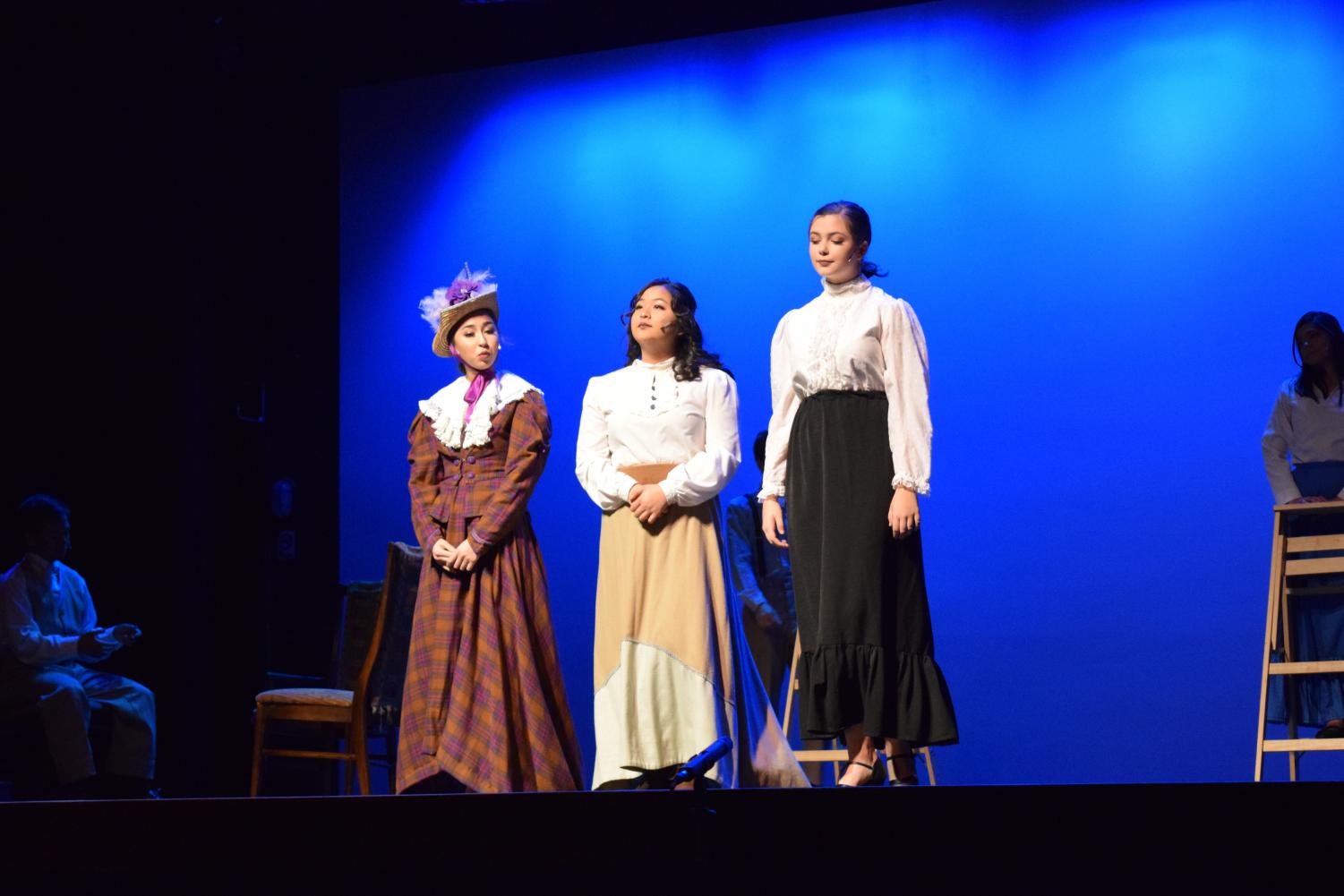“Our Town” presents a complicated tale of American life
December 1, 2017
Here’s the thing about “Our Town.”
We didn’t understand it. In fact, we’re not even sure if we truly understand it now.
We went into DVHS Drama Program’s performance of the Thornton Wilder play with the expectation that this would be straightforward — but we were approaching a modernist play that embodies the nihilism common in the early 20th century.
What we found is that in the whirlwind of meta monologues, nonexistent props, and very, very subtle but important lines in the script, there was no direct tone that each of the three acts wanted to communicate; in effect, we were lost in the process, and left unclear of the play’s motive and message.
But Mr. Paul Vega, DVHS drama teacher and “Our Town” director, anticipated this confusion.
“This play emphasizes the importance of relationships over possessions and things,” he said, loosely providing the theme of the play in his introduction prior to the performance.
“Our Town” tells the story of the typical American town, but the play is technically set in fictional Grover’s Corner, NH. Two families, the Gibbs and the Webbs, live out their lives, showing what is yet another day: the mother cooks breakfast, the father reads a newspaper, the kids go to school, etc. And while Wilder offers the history and demographics of the town, its description doesn’t distinguish it in any way. It all just sounds like statistics — and phenomenally, Wilder seemed to use the scene as a way to purposefully encourage the audience to zone out. The information is so specific and original, that it makes the town seem normal and boring.
“All males vote at the age of 21. Women vote indirect. We’re lower middle class: sprinkling of professional men … 10 percent illiterate laborers,” Mr. Webb (Onaje Berry) drones as the Stage Manager (Marie Bast) invites him to introduce the town to the audience in the first act.
The keyword here is “introduce.” It became apparent very quickly that this play is not the kind one would see anywhere else.
Apart from a few old chairs on stage, the script dictates no props and no scenery Bast sets the scene with narration, pointing at distinct corners of the auditorium to illustrate places within the town; “over here,” she says, pointing towards the back, and a few heads in the audience turned, as if they could really see the rich, white house on the hill.
Bast’s pointing wasn’t random either; Alison Lee, who plays Mrs. Gibbs, attests that each actor had to accurately portray their actions as they used no props, which meant the detail that went into rehearsing was vital.
“I drew a map,” Bast laughs, recalling what she did to learn the layout of the imaginary town. Overall, the detailed actions were brilliantly executed, and the audience’s imaginations flourished naturally.
Then, what little props are actually used in the play are brought onstage in accordance with the Stage Manager’s monologue. The chairs are shifted, and two trellises are brought on stage to act as the doorways into the homes of the two families, as written by Wilder in the notes of the play. This is hardly explained.
“This is our doctor’s house — Doc Gibbs’s. This is the back door,” the Stage Manager supposedly says, but in the moment, it was lost when two beautiful, but distracting, arched trellises were brought on stage by the crew.
The characters are introduced by the Stage Manager. Dr. Gibbs (James Miguel Patricio) is introduced first, and the ordinary quality of the day is supplemented by the paperboy Joe Crowell, Jr. (Alliah Myles Patricio). As she hurls imaginary newspapers to the doorsteps of imaginary houses, Howie Newsome (Gavin Richard) delivers the milk, calming an imaginary cow. Their performance is so convincing, while the bells on the imaginary cow ring, ol’ Bessie seems to actually exist.
“We’ve got that second day confidence that Mr. Vega told us about,” Richard commented on the casts’ excitement for the performance.
The contrast between the two families is introduced with Mrs. Gibbs and Mrs. Webb (Lauren Ottley). The kids, George Gibbs (Jaden Salinas), Rebecca Gibbs (Samantha Frias), Wally Webb (Jared Fisher) and Emily Webb (Srishti Modgil), all reflect the virtues of childhood innocence, but the interaction between George and Emily suggests a progression into something more. Professor Willard (Bianca Zhou) introduces the geography and history of Grover’s Corners to the audience, and the Stage Manager invites Mr. Webb to explain demographics, which switches on the auditorium lights and turns the performance into an ultra-meta interaction with the crowd: actors Sam Denton, Tiffany To and Alysa Perez sat in the audience and shouted the questions they want answered, most revolving around changes they want to see in their town.
The audience can’t actually ask any questions of their own, of course, but the sheer peculiarity of the scene was reflected in the gasps of audience members surprised by the sudden lights.
George and Emily’s relationship develops over time — the cast gets to know them more as they attend school, confront each other on how they’ve changed and even go on a little milkshake date.
But then the big wedding comes, and DVHS Drama’s interpretation of the scene creates a confused tone. There’s a sense of panic onstage — while the parents reminisce about past worries and woes of marriage, the children seem awkward, which could be chalked up to a few different things.
“As far as the awkwardness goes, that generally stems from having high school students pretend that they’re getting married. As much as you want to practice it … there’s going to be some awkwardness to it,” Vega chuckled.
Modgil and Salinas are DVHS Drama Program first-timers, but according to Vega, it was their innocence, and “the way they naturally reacted to things” was what pulled them towards to roles of George and Emily. And this choice makes sense for the majority of the play. The first act explores the coming-of-age story of George and Emily, and the innocence Vega cites is effective as it depicts the way adolescence should be depicted.
But in this second act, the subtle tones of Wilder’s portrayal of marriage was lost by the awkwardness of acting out a marriage in their first time on the Dougherty stage.
“Wilder’s intention for the scene was to show that most marriages were rather ordinary — that it’s something that almost everyone does. But with the instance of George and Emily, because we knew them, there was a uniqueness to the wedding,” Vega explained, referring to the Stage Manager (“Once in a thousand times [a marriage] is interesting,” she boasts) and Mrs. Soames, played by Izzy Roth (“Perfectly lovely wedding! Loveliest wedding I’ve ever saw!” She exclaims), back in the script.
But the characters of George and Emily felt like they weren’t developed well enough in the first act to justify calling their marriage unique in the second. Their innocence may have painted a different picture of the marriage than what was perhaps intended; rather than an example of the importance of building relationships, it seemed like a pessimistic view on an important turning point in life.
The standout character in this play ends up to be the unassuming Mrs. Soames, however. Roth’s performance of Soames’ excited outburst is especially convincing, and serves as a drastic contrast to the unemotional drone of the Stage Manager, and her characterization as a busybody puts her in the present for every moment she experiences — an antithesis of Wilder’s theme of nihilism.
“She’s kind of loopy, and she takes in every moment. That’s something she doesn’t need to learn by being dead,” Roth commented on her character. “But other than that she’s kind of stupid.”
“I think that we mistake simplicity with stupidity,” Vega responded. “But there is an innocence, and a really admirable quality about [Mrs. Soames].”
With rows and rows of chairs lined up on stage, the Stage Manager explains that nine years have past. Our characters stare solemnly forward, and the setting becomes more complicated, yet also more clear, as Emily arrives in a black cloak — where we are now is nothing less than a graveyard. Emily yearns to return to life one more time, then becomes upset with the fact that the living only seem to be going through the motions.
“Do any human beings ever realize life while they live it? — every, every minute?” Emily exclaims.
In this line, Wilder’s upset over how people simply throw away their lives is most apparent. While the first two acts simply depict the speed at which people move through life, the peak of self-reflection and dissatisfaction is expressed within this third act, no doubt the most important of the play.
“It was amazing, and I absolutely loved the third part because it had so much emotion in it,” DVHS parent Deepika Tikku commented.
Likewise, “it was professional and very well executed,” sophomore Connie Wang agreed.
Through all of its complexities, this rendition of “Our Town” simply didn’t meet the mark for understanding the first time through. The intent of this play was just too different from the easy storylines of past productions such as “12 Angry Jurors,” “Urinetown: the Musical” and even the hard-hitting history of “The Diary of Anne Frank.”
“Its not that I don’t expect the audience to get it,” Vega clarified, “but sometimes you watch something, you won’t necessarily take it in.”
There’s a line that deems this play as the classic it is, and it may just be a major part of the reason this play won a Pulitzer Prize.
“We all know that something is eternal,” the Stage Manager monologues.
And this quote doesn’t need context to be understood. While the build up towards this ultimatum was confusing, the universality of this statement could be understood by everyone.
“In Act Three when the Stage Manager is talking, and she’s saying that deep down inside all of us there is something we all know and appreciate that lasts forever,” Vega continues, “it’s not the things we own. It’s not the money we make; it’s something about ourselves, the humanistic part of it that lives on for at least several generations. And that’s made a significant impact many generations beyond [just us].



